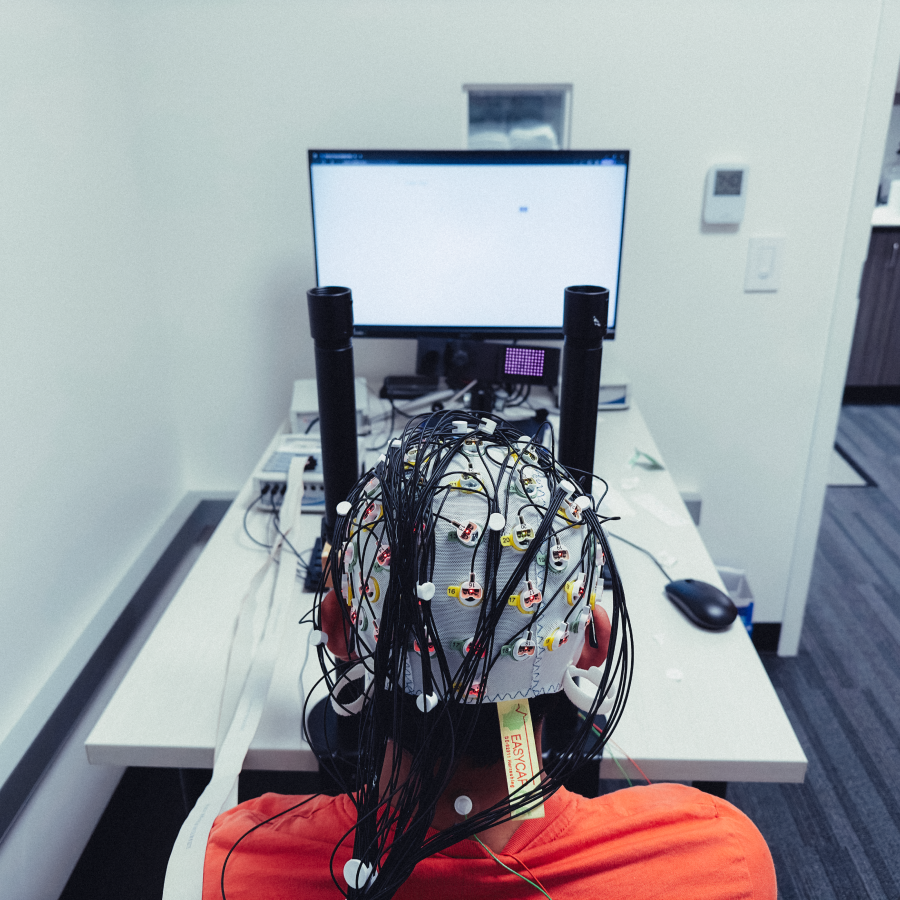Chronoscape
Modulating perception of time using Vestibular Stimulation
Role: Conception, Programming, Hardware Design, Experiment Design, Analysis
Advisor: Prof. Misha Sra
Duration: 16 weeks (2024)
Duration: 16 weeks (2024)

Overview
This research explores the profound impact of the vestibular system on time perception, a fundamental cognitive process that shapes our understanding of the world. Through an innovative experiment utilizing Galvanic Vestibular Stimulation (GVS), we demonstrate how modulating vestibular inputs can significantly alter time perception in healthy adults. Our findings not only advance our understanding of vestibular-cognitive interactions but also open new avenues for exploring the malleability of temporal experiences. These discoveries pave the way for future applications in cognitive science, potentially informing interventions for disorders affecting time perception and enhancing our understanding of temporal cognition.
Provocation
The nature of time has always been a source of intrigue, a puzzle that has captivated the minds of philosophers, scientists, and artists alike. For me, this fascination began with a seemingly innocuous episode of Dexter's Laboratory, where a "Time Expansion Helmet" allowed the wearer to slow down the passage of time. The idea that one could manipulate their perception of time through a simple invention sparked my imagination and set me on a path of lifelong curiosity. This initial spark ignited a recurring theme of temporality throughout my work, an enduring fascination that continues to drive my exploration of the enigmatic nature of time and its perception.
Serendipitously, in 2022, I chanced upon a copy of William James' presentation on the perception of time in the Journal of Speculative Philosophy from 1886. This discovery put me in touch with this curiosity at a time when I was converging on an idea for my graduate thesis.
Vestibular-Temporal Connections
Time perception plays a crucial role in our daily lives, influencing decision-making, planning, and our overall experience of reality. While traditionally associated with neural circuits in the brain, recent studies have hinted at a surprising influence: the vestibular system. Known primarily for its role in balance and spatial orientation, the vestibular system's impact on higher-order cognitive functions, including time perception, is only beginning to be understood. Our research delves into this fascinating intersection, using Galvanic Vestibular Stimulation (GVS) to investigate how vestibular inputs affect time perception in healthy adults. Through carefully designed experiments, we've uncovered intriguing insights that challenge our understanding of how we experience the passage of time.



Experiment: Altering Time Perception through Vestibular Stimulation
Our experiment employed a comprehensive procedure to investigate GVS effects on time perception. Using purpose-built GVS hardware and a specially developed iOS application, we conducted a series of tasks including GVS calibration, reaction time assessments, temporal bisection, and temporal production tasks. The results were striking: participants experienced notable changes in time perception under GVS conditions, including:
- A subjective contraction of time, where intervals were perceived as shorter than they actually were
- Longer temporal productions, indicating an altered sense of duration
- Improved reaction times, suggesting enhanced temporal processing
These findings hint at the profound influence of vestibular inputs on our perception of time, revealing the malleability of our temporal experiences through sensory stimulation.



Time Perception in HCI: Superhot in Virtual Reality
We explored a practical application of our GVS system by integrating it with the VR game Superhot, where time moves only when the player moves. Our goal was to use GVS to create the illusion of time contracting during intense gameplay moments, enhancing the game's unique mechanics. A pilot study compared Superhot VR with and without GVS-induced time contraction. Participants reported a significantly heightened sense of presence and engagement with GVS, experiencing more intense and demanding gameplay. The time contraction effect made players feel pushed to their limits, relying on split-second decisions and lightning-fast reflexes.


Our research contributes to understanding the vestibular system's role in temporal processing and demonstrates practical applications in VR and gaming. The implications extend to cognitive neuroscience, VR/AR development, gaming, human-computer interaction, and potential therapeutic applications for time perception disorders.
This project is part of ongoing research and is under review. For more information or collaboration opportunities, feel free to reach out.